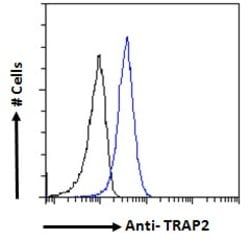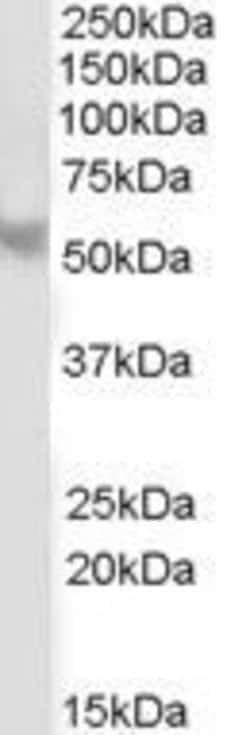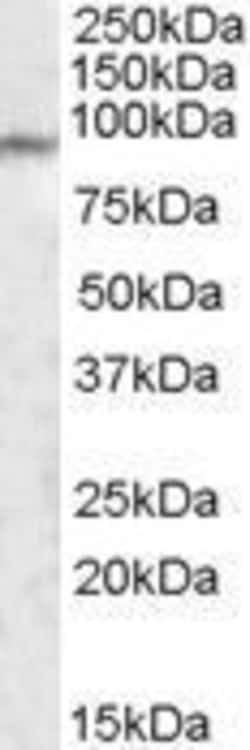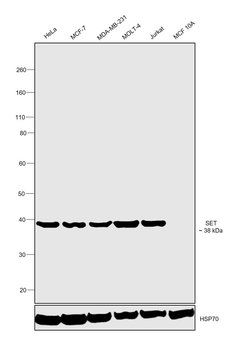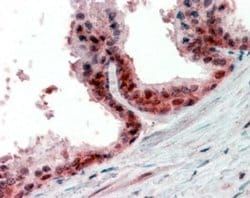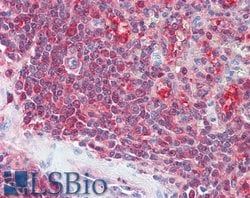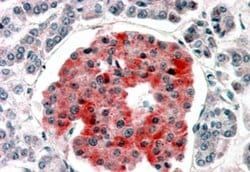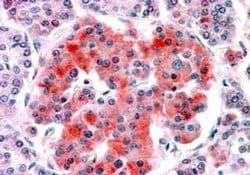PSME2 Polyclonal Antibody, Invitrogen™
Manufacturer: Thermo Scientific
Select a Size
| Pack Size | SKU | Availability | Price |
|---|---|---|---|
| Each of 1 | PIPA518708-Each-of-1 | In Stock | ₹ 46,502.50 |
PIPA518708 - Each of 1
In Stock
Quantity
1
Base Price: ₹ 46,502.50
GST (18%): ₹ 8,370.45
Total Price: ₹ 54,872.95
Antigen
PSME2
Classification
Polyclonal
Conjugate
Unconjugated
Gene
PSME2
Gene Alias
11S regulator complex beta subunit; 11S regulator complex subunit beta; AA589371; Activator of multicatalytic protease subunit 2; AI788882; cell migration-inducing protein 22; MCP activator, 31-kD subunit; PA28b; Pa28b1; PA28beta; protease (prosome, macropain) 28 subunit, beta; proteasome (prosome, macropain) 28 subunit, beta; proteasome (prosome, macropain) activator subunit 2; proteasome (prosome, macropain) activator subunit 2 (PA28 beta); proteasome activator 28 subunit beta; proteasome activator 28-beta; proteasome activator complex subunit 2; proteasome activator hPA28 subunit beta; proteasome activator subunit 2; Psme2; REGbeta; REG-beta
Host Species
Goat
Purification Method
Ammonium sulfate precipitation
Regulatory Status
RUO
Gene ID (Entrez)
5721
Content And Storage
-20° C, Avoid Freeze/Thaw Cycles
Form
Liquid
Applications
Immunohistochemistry, Western Blot
Concentration
0.5 mg/mL
Formulation
TBS with 0.5% BSA and 0.02% sodium azide; pH 7.3
Gene Accession No.
Q9UL46
Gene Symbols
PSME2
Immunogen
Synthetic peptide sequence (NLEKIVNPKGEEKP) corresponding to the C-terminus amino acids of PSME2
Quantity
100 μg
Primary or Secondary
Primary
Target Species
Human
Product Type
Antibody
Isotype
IgG
Description
- This antibody is predicted to react with canine, mouse and rat based on sequence homology
- This antibody is tested in Peptide ELISA: antibody detection limit dilution 32,000
- Proteolytic degradation is critical to the maintenance of appropriate levels of short-lived and regulatory proteins as important and diverse as those involved in cellular metabolism, heat shock and stress response, antigen presentation, modulation of cell surface receptors and ion channels, cell cycle regulation, transcription, and signalling factors
- The ubiquitin-proteasome pathway deconstructs most proteins in the eukaryotic cell cytosol and nucleus
- Others are degraded via the vacuolar pathway which includes endosomes, lysosomes, and the endoplasmic reticulum
- The 26S proteasome is an ATP-dependent, multisubunit (approximately 31), barrel-shaped molecular machine with an apparent molecular weight of approximately 2.5 MDa
- It consists of a 20S proteolytic core complex which is crowned at one or both ends by 19S regulatory subunit complexes
- The 19S regulatory subunits recognize ubiquitinated proteins and play an essential role in unfolding and translocating targets into the lumen of the 20S subunit
- An enzymatic cascade is responsible for the attachment of multiple ubiquitin molecules to lysine residues of proteins targeted for degradation
- Several genetic diseases are associated with defects in the ubiquitin-proteasome pathway
- Some examples of affected proteins include those linked to cystic fibrosis, Angelman's syndrome, and Liddle syndrome.
